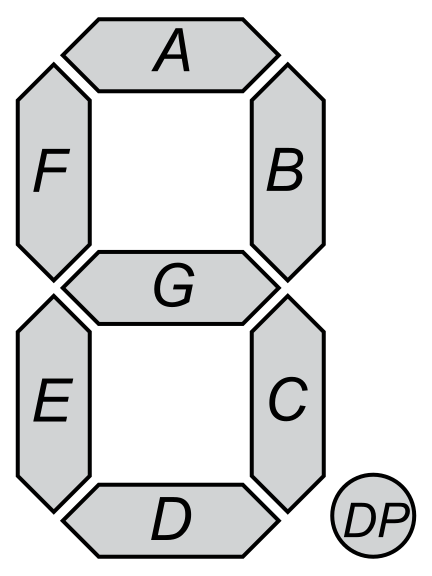I’ve been doing the Weekly
Challenges. The
latest
involved array searching and an emulated seven-segment display. (Note
that this is open until the end of today.)
Goodness, challenge #200 - nearly four years since this started.
The first one I did was number 14, only in Perl to start with; I might
at some point go back and give the first ones the polyglot treatment.
(Not to mention the "better programmer than I was then" treatment.)
Many thanks to Mohammad Anwar for keeping this going!
Task 1: Arithmetic Slices
You are given an array of integers.
Write a script to find out all Arithmetic Slices for the given array of integers.
An integer array is called arithmetic if it has at least 3 elements and the differences between any three consecutive elements are the same.
This looks as though it needs an exhaustive search. The only
optimisation I put in is that if a slice (a..b) is valid, any slice
that starts at a and goes on beyond b must also be valid, so we
don't need to test it, just add it to the output list.
(The other approach that occurred to me after I'd written this in the
usual nine languages would be to note the indices of each triplet that
matches the definition, then filter all possible ranges for ones that
include at least one matching triplet. Too late now.)
Rust:
fn arithmeticslices(l: Vec<isize>) -> Vec<Vec<isize>> {
let mut o = Vec::new();
if l.len() >= 3 {
for a in 0..=l.len() - 3 {
let mut valid = false;
for b in a + 2..=l.len() - 1 {
let mut v = vec![0; b - a + 1];
v.copy_from_slice(&l[a..=b]);
if !valid {
for i in 0..=v.len() - 3 {
if v[i + 1] - v[i] == v[i + 2] - v[i + 1] {
valid = true;
break;
}
}
}
if valid {
o.push(v);
}
}
}
}
o
}
Task 2: Seven Segment 200
Submitted by: Ryan J Thompson
A seven segment display is an electronic component, usually used to display digits. The segments are labeled 'a' through 'g' as shown:

The encoding of each digit can thus be represented compactly as a truth table:
my @truth = qw<abcdef bc abdeg abcdg bcfg acdfg a cdefg abc abcdefg abcfg>;
For example, $truth[1] = 'bc'. The digit 1 would have segments 'b' and 'c' enabled.
Write a program that accepts any decimal number and draws that number as a horizontal sequence of ASCII seven segment displays, similar to the following:
------- ------- -------
| | | | |
| | | | |
-------
| | | | |
| | | | |
------- ------- -------
To qualify as a seven segment display, each segment must be drawn (or not drawn) according to your @truth table.
The number "200" was of course chosen to celebrate our 200th week!
Rather than the provided truth table I use a bitmap table disp
containing the character shapes (bit 0 being equivalent to the "a"
cell, bit 1 "b", etc.; I prefer no bottom bar on the digit 9), and
write each bar into cells of a string array (depending on the
language, each line is either a string that I can poke at directly or
more usually an array of characters that I'll combine into a string
for printing).
If I were writing this for more general use I'd probably make the
actual display routine take a string or array-of-digits input, and
separate out the number-to-string conversion, so that I could also
show hex digits (bitmap values 0x77, 0xfc, 0x39, 0x5e, 0x79, 0x71).
Also perhaps separate the bitmap lookups and the segment drawing, with
an intermediary array of bitmaps, to allow for multiple output
formats.
Raku:
sub sevensegment($l) {
my @disp = (0x3f, 0x06, 0x5b, 0x4f, 0x66, 0x6d, 0x7d, 0x07, 0x7f, 0x67);
my @v;
if ($l == 0) {
@v.push(0);
} else {
my $ll = $l;
while ($ll > 0) {
@v.push($ll % 10);
$ll div= 10;
}
@v = @v.reverse;
}
my @d = [" " xx 6 * @v.elems] xx 7;
for (@v.kv) -> $i, $vv {
my $x = 6 * $i;
my $da = @disp[$vv];
if ($da +& 1 > 0) {
for ($x + 1..$x + 3) -> $xa {
@d[0][$xa] = '#';
}
}
if ($da +& 2 > 0) {
for (1..2) -> $y {
@d[$y][$x + 4] = '#';
}
}
if ($da +& 4 > 0) {
for (4..5) -> $y {
@d[$y][$x + 4] = '#';
}
}
if ($da +& 8 > 0) {
for ($x + 1..$x + 3) -> $xa {
@d[6][$xa] = '#';
}
}
if ($da +& 16 > 0) {
for (4..5) -> $y {
@d[$y][$x] = '#';
}
}
if ($da +& 32 > 0) {
for (1..2) -> $y {
@d[$y][$x] = '#';
}
}
if ($da +& 64 > 0) {
for ($x + 1..$x + 3) -> $xa {
@d[3][$xa] = '#';
}
}
}
for (@d) -> @r {
say @r.join('');
}
}
which produces
### ### ###
# # # # #
# # # # #
###
# # # # #
# # # # #
### ### ###
Now I'm remembering fourteen- and sixteen-segment alphanumeric
displays…
Full code on
github.
Comments on this post are now closed. If you have particular grounds for adding a late comment, comment on a more recent post quoting the URL of this one.